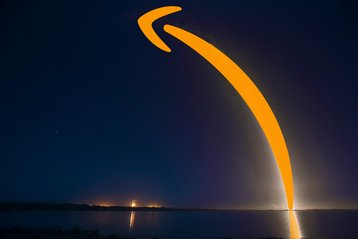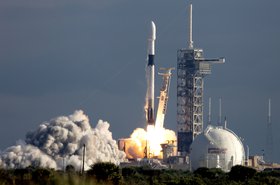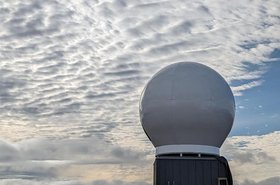Amazon has made the largest commercial launch deal ever to support its Project Kuiper satellite Internet service.
The company has signed agreements with three different rocket companies for a total of 83 launches - taking the majority of the spare medium- and heavy-lift launch capacity for the next five years from companies that are not SpaceX. Kuiper is expected to consist of 3,236 satellites in low-Earth orbit.
The company partnered with Arianespace for 18 launches of Europe's new Ariane 6 rocket. It teamed up with the United Launch Alliance for 38 launches of the company's Vulcan rocket. Finally, Amazon turned to the Jeff Bezos-owned Blue Origin for 12 launches of the company's New Glenn rocket, and the option for 15 additional launches.
Amazon previously said that it had purchased the final nine Atlas V rocket launches from United Launch Alliance. The rocket, which uses Russian-made engines, is set to retire.
None of the new contracts involve rockets that have made successful launches, so may be delayed.
“We still have lots of work ahead, but the team has continued to hit milestone after milestone across every aspect of our satellite system. These launch agreements reflect our incredible commitment and belief in Project Kuiper,” Dave Limp, Amazon senior vice president of devices and services, said.
A deal with SpaceX was notably absent, despite the company now being the largest commercial rocket launcher, and the cheapest. That could be because SpaceX is developing its own satellite Internet service, Starlink, which it launches on its own rockets. Last year, Amazon told the FCC that SpaceX should be forced to rework its Starlink regulatory submission due to Elon Musk's history of breaking regulations.
Starlink is ahead of Kuiper, with around 2,110 satellites already in orbit. It has an FCC license for a total of 12,000 satellites, but is seeking authorization for another 30,000 in a second generation constellation.
The service requires an expensive satellite dish - but already has around 250,000 subscribers. Starlink is being used in Ukraine to help some maintain connectivity during Russia's invasion.
Project Kuiper is still in the testing phase. In November, Amazon applied for permission to launch two KuiperSats in late 2022 to test its equipment. The satellites will be placed into orbit using ABL Space Systems' RS1 rocket, which has also not made a successful commercial launch.
In January, ABL said that a test failure that destroyed the upper stage of its RS1 rocket will delay its first flight by three months.
OneWeb, another low Earth orbit (LEO) satellite firm, was recently forced to use SpaceX rockets for future launches after cutting ties with Russian rockets and launchpads in the wake of Russia's invasion of Ukraine and a public falling out with the Roscosmos space agency.




